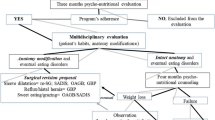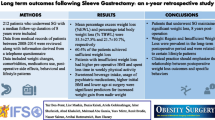Abstract
Introduction
Identifying eating and lifestyle behaviors prior to bariatric surgery may assist in better selecting and preparing patients and might lead to improved success rate. The current study aimed to assess eating behaviors and lifestyle trends among laparoscopic sleeve gastrectomy (LSG) candidates and to compare those trends between genders.
Methods
This descriptive study was conducted in the bariatric clinic at the Haifa Assuta Medical Center. Data was gathered from medical records of LSG candidates that were evaluated before surgery in our institution between 2008 and 2011. The data included demographics, comorbidities, anthropometrics, weight management history, and lifestyle parameters. Eating pattern and eating habits were determined by eating habits questionnaires.
Results
A total of 266 LSG surgery candidates (71.4 % female) with an average age of 40.7 ± 10.9 years and pre-surgery BMI of 42.4 ± 4.8 kg/m2 were studied. More than half of the patients have family history of obesity and their onset of obesity was before the age of 18 years (54.5 and 57.9 %, respectively). Most of the patients reported on poor eating habits and sedentary lifestyle: 65.1 % do not eat regular meals, 70.3 % skip over breakfast, 61.9 % presented loss of control eating, 45 % frequently consume sweets, and 80.1 % were classified as none active. There were no differences in eating patterns or lifestyle parameters between genders.
Conclusion
High occurrence of unhealthy eating habits and a non-active lifestyle were detected in morbid obese candidates for LSG surgery. More efforts should be directed towards nutritional and lifestyle education prior to the surgery.

Similar content being viewed by others
References
Colquitt JL, Pickett K, Loveman E, Frampton GK. Surgery for weight loss in adults. Cochrane Database Syst Rev. 2014;8:Cd003641.
de Lima KV, Costa MJ, Goncalves Mda C, Sousa BS. Micronutrient deficiencies in the pre-bariatric surgery. Arquivos brasileiros de cirurgia digestiva: ABCD = Brazilian Archives of Digestive Surgery. 2013;26 Suppl 1:63–6.
Wimmelmann CL, Dela F, Mortensen EL. Psychological predictors of weight loss after bariatric surgery: a review of the recent research. Obes Res Clin Pract. 2014;8(4):e299–313.
Kulick D, Hark L, Deen D. The bariatric surgery patient: a growing role for registered dietitians. J Am Diet Assoc. 2010;110(4):593–9.
Moize VL, Pi-Sunyer X, Mochari H, Vidal J. Nutritional pyramid for post-gastric bypass patients. Obes Surg. 2010;20(8):1133–41.
McGrice M, Don Paul K. Interventions to improve long-term weight loss in patients following bariatric surgery: challenges and solutions. Diab Metab Syndr Obes: Targets Ther. 2015;8:263–74.
Snyder-Marlow G, Taylor D, Lenhard MJ. Nutrition care for patients undergoing laparoscopic sleeve gastrectomy for weight loss. J Am Diet Assoc. 2010;110(4):600–7.
Heinberg LJ, Keating K, Simonelli L. Discrepancy between ideal and realistic goal weights in three bariatric procedures: who is likely to be unrealistic? Obes Surg. 2010;20(2):148–53.
Robinson AH, Adler S, Stevens HB, Darcy AM, Morton JM, Safer DL. What variables are associated with successful weight loss outcomes for bariatric surgery after 1 year? Surg Obes Relat Dis: Off J Am Soc Bariatric Surg. 2014;10(4):697–704.
Ruiz-Lozano T, Vidal J, de Hollanda A et al. Timing of food intake is associated with weight loss evolution in severe obese patients after bariatric surgery. Clin Nutr (Edinburgh, Scotland). 2016.
Miras AD, Al-Najim W, Jackson SN, McGirr J, Cotter L, Tharakan G, et al. Psychological characteristics, eating behavior, and quality of life assessment of obese patients undergoing weight loss interventions. Scand J Surg : SJS: Off Organ Finn Surg Soc Scand Surg Soc. 2015;104(1):10–7.
Opolski M, Chur-Hansen A, Wittert G. The eating-related behaviours, disorders and expectations of candidates for bariatric surgery. Clin Obes. 2015;5(4):165–97.
Toolabi K, Arefanian S, Golzarand M, Arefanian H. Effects of laparoscopic Roux-en-Y gastric bypass (LRYGB) on weight loss and biomarker parameters in morbidly obese patients: a 12-month follow-up. Obes Surg. 2011;21(12):1834–42.
Farinholt GN, Carr AD, Chang EJ, Ali MR. A call to arms: obese men with more severe comorbid disease and underutilization of bariatric operations. Surg Endosc. 2013;27(12):4556–63.
Kennedy-Dalby A, Adam S, Ammori BJ, Syed AA. Weight loss and metabolic outcomes of bariatric surgery in men versus women—a matched comparative observational cohort study. Eur J Int Med. 2014;25(10):922–5.
Stroh C, Weiner R, Wolff S, Knoll C, Manger T. Are there gender-specific aspects in obesity and metabolic surgery? Data analysis from the German bariatric surgery registry. Viszeralmedizin. 2014;30(2):125–32.
Quick V, Wall M, Larson N, Haines J, Neumark-Sztainer D. Personal, behavioral and socio-environmental predictors of overweight incidence in young adults: 10-yr longitudinal findings. Int J Behav Nut Phys Act. 2013;10:37.
Amigo-Vazquez I, Busto-Zapico R, Errasti-Perez JM, Pena-Suarez E. Skipping breakfast, sedentarism and overweight in children. Psychol, Health Med. 2016:1-8.
Franko DL, Striegel-Moore RH, Thompson D, Affenito SG, Schreiber GB, Daniels SR, et al. The relationship between meal frequency and body mass index in black and white adolescent girls: more is less. Int J Obes (2005). 2008;32(1):23–9.
Herring LY, Stevinson C, Davies MJ, Biddle SJ, Sutton C, Bowrey D, et al. Changes in physical activity behaviour and physical function after bariatric surgery: a systematic review and meta-analysis. Obes Rev Off J Int Assoc Study Obes. 2016;17(3):250–61.
Baillot A, Mampuya WM, Dionne IJ et al. Impacts of supervised exercise training in addition to interdisciplinary lifestyle management in subjects awaiting bariatric surgery: a randomized controlled study. Obes Surg. 2016.
Mechanick JI, Youdim A, Jones DB, Garvey WT, Hurley DL, McMahon MM, et al. Clinical practice guidelines for the perioperative nutritional, metabolic, and nonsurgical support of the bariatric surgery patient—2013 update: cosponsored by American Association of Clinical Endocrinologists, The Obesity Society, and American Society for Metabolic & Bariatric Surgery. Obes (Silver Spring, Md). 2013;21 Suppl 1:S1–27.
Zabatiero J, Hill K, Gucciardi DF et al. Beliefs, barriers and facilitators to physical activity in bariatric surgery candidates. Obes Surg. 2015.
Israel Central Bureau of Statistics Web site [Internet]. The State of Israel. Israel Central Bureau of Statistics. Available from: http://www.cbs.gov.il.
Maniscalco M, Carratu P, Faraone S, Cerbone MR, Cristiano S, Zedda A, et al. Smoking habit in severe obese after bariatric procedures. Tob Induc Dis. 2015;13(1):20.
Conason A, Teixeira J, Hsu CH, Puma L, Knafo D, Geliebter A. Substance use following bariatric weight loss surgery. JAMA Surg. 2013;148(2):145–50.
Sanchez A, Rojas P, Basfi-Fer K, et al. Micronutrient deficiencies in morbidly obese women prior to bariatric surgery. Obes Surg. 2015.
Coupaye M, Riviere P, Breuil MC, Castel B, Bogard C, Dupre T, et al. Comparison of nutritional status during the first year after sleeve gastrectomy and Roux-en-Y gastric bypass. Obes Surg. 2014;24(2):276–83.
Dagan SS, Zelber-Sagi S, Webb M, et al. Nutritional status prior to laparoscopic sleeve gastrectomy surgery. Obes Surg. 2016.
Bal BS, Finelli FC, Shope TR, Koch TR. Nutritional deficiencies after bariatric surgery. Nat Rev Endocrinol. 2012;8(9):544–56.
Neff KJ, Olbers T, le Roux CW. Bariatric surgery: the challenges with candidate selection, individualizing treatment and clinical outcomes. BMC Med. 2013;11:8.
Alvarado R, Alami RS, Hsu G, Safadi BY, Sanchez BR, Morton JM, et al. The impact of preoperative weight loss in patients undergoing laparoscopic Roux-en-Y gastric bypass. Obes Surg. 2005;15(9):1282–6.
Wang T, Jia W, Hu C. Advancement in genetic variants conferring obesity susceptibility from genome-wide association studies. Front Med. 2015;9(2):146–61.
Parikh M, Hetherington J, Sheth S, Seiler J, Ostrer H, Gerhard G, et al. Frequencies of obesity susceptibility alleles among ethnically and racially diverse bariatric patient populations. Surg Obes Relat Dis Off J Am Soc Bariatric Surg. 2013;9(3):436–41.
Moize V, Deulofeu R, Torres F, de Osaba JM, Vidal J. Nutritional intake and prevalence of nutritional deficiencies prior to surgery in a Spanish morbidly obese population. Obes Surg. 2011;21(9):1382–8.
Jastrzebska-Mierzynska M, Ostrowska L, Hady HR, Dadan J. Dietary habits of obese patients qualified for bariatric procedures. Rocz Panstw Zakl Hig. 2014;65(1):41–7.
Author information
Authors and Affiliations
Corresponding author
Ethics declarations
Conflict of Interest
The authors declare that they have no conflict of interest.
Ethical Approval
All procedures performed in this study were in accordance with the ethical standards of the institutional research committee and with the 1964 Helsinki Declaration and its later amendments.
Statement of Informed Consent
For this type of study formal consent is not required.
Additional information
An erratum to this article is available at http://dx.doi.org/10.1007/s11695-017-2772-9.
Rights and permissions
About this article
Cite this article
Oved, I., Vaiman, I.M., Hod, K. et al. Poor Health Behaviors Prior to Laparoscopic Sleeve Gastrectomy Surgery. OBES SURG 27, 469–475 (2017). https://doi.org/10.1007/s11695-016-2358-y
Published:
Issue Date:
DOI: https://doi.org/10.1007/s11695-016-2358-y




